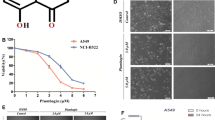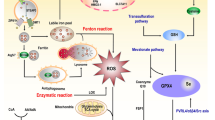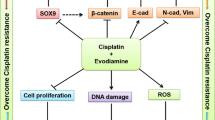Abstract
Background
Naringenin, a flavonoid compound, has a wide variety of uses in the pharmaceutical industry for its antioxidant and anti-inflammatory potential.
Objectives
The current experiment aimed to investigate the anticancer effect of naringenin in triple-negative human breast cancer cells (MDA-MR-231) and an animal model with 7,12-dimethylbenz[a] anthracene (DMBA)-induced breast cancer in female rats to determine the mechanisms and molecular targets.
Methods
The cytotoxic effects of naringenin against MDA-MB-231 cells were assessed by MTT assay. Apoptosis and cell cycle alterations were analyzed via flow cytometry. Morphological and biochemical changes in DMBA-induced cancer with naringenin treatment were assayed using our protocol. The potential mechanisms of action were verified via qRT-PCR.
Results
Naringenin was found to inhibit cell proliferation in a time- and concentration-dependent manner. This effect was associated with cell cycle arrest at the G0/G1 phase, along with apoptosis and deposition at the sub-G1 phase (75%). Treatment with naringenin reduced tumor incidence (45.55, 40, and 27.67%) and tumor burden (78.7, 35.4, and 1.2 g) in a dose-dependent manner. Naringenin treatment altered the biochemical and antioxidant parameters related to inflammation necessary for anticancer activity. The qRT-PCR studies further confirmed the mitochondrial-mediated apoptotic effects of naringenin.
Conclusion
On the basis of these results, we can conclude that naringenin exerts an anticancer effect in the MDA-MB-231 cell line that arrests cell development at the G0/G1 phase, and in vivo it alters the mitochondrial-mediated intrinsic pathway responsible for apoptosis.










Similar content being viewed by others
References
Agarwal G, Pradeep PV, Aggarwal V et al (2007) Spectrum of breast cancer in Asian women. World J Surg. https://doi.org/10.1007/s00268-005-0585-9
Amin A, Alkaabi A, Al-Falasi S, Daoud SA (2005) Chemopreventive activities of Trigonella foenum graecum (Fenugreek) against breast cancer. Cell Biol Int. https://doi.org/10.1016/j.cellbi.2005.04.004
Anbuselvam C, Vijayavel K, Balasubramanian MP (2007) Protective effect of Operculina turpethum against 7,12-dimethyl benz(a)anthracene induced oxidative stress with reference to breast cancer in experimental rats. Chem Biol Interact. https://doi.org/10.1016/j.cbi.2007.04.007
Babcock TA, Helton WS, Hong D, Espat NJ (2002) Omega-3 fatty acid lipid emulsion reduces LPS-stimulated macrophage TNF-alpha production. Surg Infect (Larchmt). https://doi.org/10.1089/109629602760105817
Batcioglu K, Uyumlu AB, Satilmis B et al (2012) Oxidative stress in the in vivo DMBA rat model of breast cancer: suppression by a voltage-gated sodium channel inhibitor (RS100642). Basic Clin Pharmacol Toxicol. https://doi.org/10.1111/j.1742-7843.2012.00880.x
Behar SM, Martin CJ, Booty MG et al (2011) Apoptosis is an innate defense function of macrophages against Mycobacterium tuberculosis. Mucosal Immunol 4(3):279–287
Bhattacharjee M, Acharya S, Ghosh A et al (2008) Bax and Bid act in synergy to bring about T11TS-mediated glioma apoptosis via the release of mitochondrial cytochrome c and subsequent caspase activation. Int Immunol. https://doi.org/10.1093/intimm/dxn109
Biswas DK, Shi Q, Baily S et al (2004) NF-B activation in human breast cancer specimens and its role in cell proliferation and apoptosis. Proc Natl Acad Sci. https://doi.org/10.1073/pnas.0403621101
Boehm JS, Zhao JJ, Yao J et al (2007) Integrative genomic approaches identify IKBKE as a breast cancer oncogene. Cell. https://doi.org/10.1016/j.cell.2007.03.052
Bray F, Ren JS, Masuyer E, Ferlay J (2013) Global estimates of cancer prevalence for 27 sites in the adult population in 2008. Int J Cancer. https://doi.org/10.1002/ijc.27711
Brenner D, Mak TW (2009) Mitochondrial cell death effectors. Curr Opin Cell Biol 21(6):871–877
Burstein E, Duckett CS (2003) Dying for NF-κB? Control of cell death by transcriptional regulation of the apoptotic machinery. Curr Opin Cell Biol 15(6):732–737
Castelló-Cros R, Khan DR, Simons J et al (2009) Staged stromal extracellular 3D matrices differentially regulate breast cancer cell responses through PI3K and beta1-integrins. BMC Cancer. https://doi.org/10.1186/1471-2407-9-94
Cazap E (2012) Screening and cancer prevention in underdeveloped environments: a global view. Cancer Res. https://doi.org/10.1158/1538-7445.AM2012-SY26-01
Chen DS, Mellman I (2013) Oncology meets immunology: the cancer-immunity cycle. Immunity 39(1):1–10
Chen WQ, Zheng RS, Zhang SW et al (2014) The incidences and mortalities of major cancers in China, 2010. Chin J Cancer. https://doi.org/10.5732/cjc.014.10084
Cragg G (1997) Natural products in drug discovery and development. J Nat Prod. https://doi.org/10.1021/np9604893
Currier N, Solomon SE, Demicco EG et al (2005) Oncogenic signaling pathways activated in DMBA-induced mouse mammary tumors. Toxicol Pathol. https://doi.org/10.1080/01926230500352226
Darby SC, McGale P, Taylor CW, Peto R (2005) Long-term mortality from heart disease and lung cancer after radiotherapy for early breast cancer: prospective cohort study of about 300 000 women in US SEER cancer registries. Lancet Oncol. https://doi.org/10.1016/S1470-2045(05)70251-5
Dodge JT, Mitchell C, Hanahan DJ (1963) The preparation and chemical characteristics of hemoglobin free ghosts of human erythrocytes. Arch Biochem Biophys 100:199–130
Dzubak P, Hajduch M, Vydra D et al (2006) Pharmacological activities of natural triterpenoids and their therapeutic implications. Nat Prod Rep 23(3):394–411
Early Breast Cancer Trialists’ Collaborative Group (EBCTCG) (2005) Effects of chemotherapy and hormonal therapy for early breast cancer on recurrence and 15-year survival: an overview of the randomised trials. Lancet. https://doi.org/10.1016/S0140-6736(05)66544-0
Early Breast Cancer Trialists' Collaborative Group (EBCTCG) (2011) Relevance of breast cancer hormone receptors and other factors to the efficacy of adjuvant tamoxifen: patient-level meta-analysis of randomised trials. Lancet. https://doi.org/10.1016/s0140-6736(11)60993-8
El Saghir NS (2011) Managing breast cancer in low and middle income countries. Breast. https://doi.org/10.1016/j.breast.2011.08.022
Gancedo JM, Gancedo C (1971) Fructose-1,6-diphosphatase, phosphofructokinase and glucose-6-phosphate dehydrogenase from fermenting and non fermenting yeasts. Arch Mikrobiol. https://doi.org/10.1007/BF00411787
Hakkak R, Holley AW, MacLeod SL et al (2005) Obesity promotes 7,12-dimethylbenz(a)anthracene-induced mammary tumor development in female zucker rats. Breast Cancer Res. https://doi.org/10.1186/bcr1263
Hamdy SM, Latif AKMA, Drees EA, Soliman SM (2012) Prevention of rat breast cancer by genistin and selenium. Toxicol Ind Health. https://doi.org/10.1177/0748233711422732
Harlan LC, Warren JL (2015) Global survival patterns: potential for cancer control. Lancet 385(9972):926–928
Hartman KG, Bortner JD, Falk GW et al (2013) Modeling inflammation and oxidative stress in gastrointestinal disease development using novel organotypic culture systems. Stem Cell Res Ther 4 (Suppl 1):S5
Harvie M, Howell A, Evans DG (2015) Can diet and lifestyle prevent breast cancer: what is the evidence? Am Soc Clin Oncol Educ B. https://doi.org/10.14694/EdBook_AM.2015.35.e66
Haupt S (2003) Apoptosis - the p53 network. J Cell Sci. https://doi.org/10.1242/jcs.00739
Horrocks JE, Ward J, King J (1963) A routine method for the determination of phosphoglucose isomerase activity in body fluid. J Clin Pathol. https://doi.org/10.1136/jcp.16.3.248
Hutti JE, Shen RR, Abbott DW et al (2009) Phosphorylation of the tumor suppressor CYLD by the breast cancer oncogene IKKε promotes cell transformation. Mol Cell. https://doi.org/10.1016/j.molcel.2009.04.031
Jagadeesan AJ, Langeswaran K, Gowtham Kumar S et al (2013) Chemopreventive potential of diosgenin on modulating glycoproteins, TCA cycle enzymes, carbohydrate metabolising enzymes and biotransformation enzymes against N-methyl-N-nitrosourea induced mammary carcinogenesis. Int J Pharm Pharm Sci 5(4):575–582
Jiang XJ, Wang XD (2004) Cytochrome C-mediated apoptosis. Annu Rev Biochem. https://doi.org/10.1146/annurev.biochem.73.011303.073706
Kamath SA, Ananth NK (1972) Interaction of Ca 2+ with endoplasmic reticulum of rat liver: a standardized procedure for the isolation of rat liver microsomes. Anal Biochem 48(1):53–58
Kaur K, Arora S, Hawthorne ME et al (2002) A correlative study on antimutagenic and chemopreventive activity of Acacia auriculiformis A. Cunn. and Acacia nilotica (L.) willd. ex del. Drug Chem Toxicol. https://doi.org/10.1081/DCT-100108471
Kavanagh KT, Hafer LJ, Kim DW et al (2001) Green tea extracts decrease carcinogen-induced mammary tumor burden in rats and rate of breast cancer cell proliferation in culture. J Cell Biochem. https://doi.org/10.1002/jcb.1164
Koopman F, Beekwilder J, Crimi B et al (2012) De novo production of the flavonoid naringenin in engineered Saccharomyces cerevisiae. Microb Cell Fact 11:155. https://doi.org/10.1186/1475-2859-11-155
Kostova I, Ojala T, Lacy A et al (2010) Natural product chemistry for drug discovery. J Nat Prod. https://doi.org/10.1021/np800144q
Kumar V, Bhatt PC, Rahman M, Kaithwas G, Choudhry H, Al-Abbasi FA, Anwar F, Verma A (2017) Fabrication, optimization, and characterization of umbelliferone β-Dgalactopyranosideloaded PLGA nanoparticles in treatment of hepatocellular carcinoma: in vitro and in vivo studies. Int J Nanomed 12:6747–6758
Lai H, Singh NP (2006) Oral artemisinin prevents and delays the development of 7,12-dimethylbenz[a]anthracene (DMBA)-induced breast cancer in the rat. Cancer Lett. https://doi.org/10.1016/j.canlet.2005.01.019
Manov I, Hirsh M, Iancu TC et al (2013) Pronounced cancer resistance in a subterranean rodent, the blind mole-rat, Spalax: in vivo and in vitro evidence. BMC Biol. https://doi.org/10.1186/1741-7007-11-91
Mayer M (2011) Living with advanced breast cancer: challenges and opportunities. Breast. https://doi.org/10.1016/j.breast.2011.08.004
Mehta RG (2000) Experimental basis for the prevention of breast cancer. In: European Journal of Cancer
Mills EL, Kelly B, Logan A et al (2016) Succinate dehydrogenase supports metabolic repurposing of mitochondria to drive inflammatory macrophages. Cell. https://doi.org/10.1016/j.cell.2016.08.064
Minari JB, Okeke U (2014) Chemopreventive effect of Annona muricata on DMBA-induced cell proliferation in the breast tissues of female albino mice. Egypt J Med Hum Genet. https://doi.org/10.1016/j.ejmhg.2014.05.001
Mitsui Y, Yamamoto K, Yamamoto M (1985) Cell surface changes in senescent and Werner’s syndrome fibroblasts: their role in cell proliferation. Adv Exp Med Biol 190:567–585
Morgan RA (2012) Human tumor xenografts: the good, the bad, and the ugly. Mol Ther. https://doi.org/10.1038/mt.2012.73
Mrksich M (2000) A surface chemistry approach to studying cell adhesion. R Soc Chem. https://doi.org/10.1039/a705397e
Niebes P (1972) Determination of enzymes and degradation products of glycosaminoglycan metabolism in the serum of healthy and varicose subjects. Clin Chim Acta. https://doi.org/10.1016/0009-8981(72)90105-2
Nnetu KD, Knorr M, Strehle D et al (2012) Directed persistent motion maintains sheet integrity during multi-cellular spreading and migration. Soft Matter. https://doi.org/10.1039/c2sm07208d
Ouhtit A, Ismail MF, Othman A et al (2014) Chemoprevention of rat mammary carcinogenesis by spirulina. Am J Pathol. https://doi.org/10.1016/j.ajpath.2013.10.025
Padler-Karavani V, Hurtado-Ziola N, Pu M et al (2011) Human xeno-autoantibodies against a non-human sialic acid serve as novel serum biomarkers and immunotherapeutics in cancer. Cancer Res. https://doi.org/10.1158/0008-5472.CAN-10-4102
Panebianco C, Eddine FBN, Forlani G, Palmieri G, Tatangelo L, Villani A, Xu L, Accolla R, Pazienza V (2018) Probiotic Bifidobacterium lactis, anti-oxidant vitamin E/C and anti-inflammatory dha attenuate lung inflammation due to pm2.5 exposure in mice. Benef Microb 10:1–8
Papadakis KA, Abreu MT (2006) Systemic consequences of intestinal inflammation. In: Targan SR, Shanahan F, Karp LC (eds) Inflammatory bowel disease: from bench to bedside. Springer, Boston, MA. https://doi.org/10.1007/0-387-25808-6_12
Patra KC, Wang Q, Bhaskar PT et al (2013) Hexokinase 2 is required for tumor initiation and maintenance and its systemic deletion is therapeutic in mouse models of cancer. Cancer Cell. https://doi.org/10.1016/j.ccr.2013.06.014
Pezzuto JM (1997) Plant-derived anticancer agents. Biochem Pharmacol 53(2):121–133
Pikarsky E, Porat RM, Stein I et al (2004) NF-κB functions as a tumour promoter in inflammation-associated cancer. Nature. https://doi.org/10.1038/nature02924
Purushothaman A, Nandhakumar E, Sachdanandam P (2013) Phytochemical analysis and anticancer capacity of Shemamruthaa, a herbal formulation against DMBA-induced mammary carcinoma in rats. Asian Pac J Trop Med. https://doi.org/10.1016/S1995-7645(13)60166-2
Sakthivel KM, Chandrasekaran G (2014) Protective effect of acacia ferruginea against ulcerative colitis via modulating inflammatory mediators, cytokine profile and NF-κB signal transduction pathways. J Environ Pathol Toxicol Oncol. https://doi.org/10.1615/JEnvironPatholToxicolOncol.2014008425
Samy RP, Rajendran P, Li F et al (2012) Identification of a novel calotropis procera protein that can suppress tumor growth in breast cancer through the suppression of NF-κB pathway. PLoS One. https://doi.org/10.1371/journal.pone.0048514
Scheiner-Bobis G (2002) The sodium pump. Its molecular properties and mechanics of ion transport. Eur J Biochem 269(10):2424–2433
Singletary K, MacDonald C, Wallig M (1996) Inhibition by rosemary and carnosol of 7,12-dimethylbenz[a] anthracene (DMBA)-induced rat mammary tumorigenesis and in vivo DMBA-DNA adduct formation. Cancer Lett. https://doi.org/10.1016/0304-3835(96)04227-9
Smith LM (2006) Potent cytotoxicity of an auristatin-containing antibody-drug conjugate targeting melanoma cells expressing melanotransferrin/p97. Mol Cancer Ther. https://doi.org/10.1158/1535-7163.MCT-06-0026
Subik K, Lee JF, Baxter L et al (2010) The expression patterns of ER, PR, HER2, CK5/6, EGFR, KI-67 and AR by immunohistochemical analysis in breast cancer cell lines. Breast Cancer Basic Clin Res. https://doi.org/10.4137/BCBCR.S0
Takahashi Y, Karbowski M, Yamaguchi H et al (2005) Loss of Bif-1 suppresses Bax/Bak conformational change and mitochondrial apoptosis. Mol Cell Biol. https://doi.org/10.1128/MCB.25.21.9369
Tamarkin L, Cohen M, Reichert C et al (1981) Melatonin inhibition and pinealectomy enhancement of 7,12-dimethylbenz(a)anthracene-induced mammary tumors in the rat. Cancer Res 41(11 Pt 1):4432–4436
Tikoo K, Sane MS, Gupta C (2011) Tannic acid ameliorates doxorubicin-induced cardiotoxicity and potentiates its anti-cancer activity: potential role of tannins in cancer chemotherapy. Toxicol Appl Pharmacol. https://doi.org/10.1016/j.taap.2010.12.012
Todoric J, Antonucci L, Karin M (2016) Targeting inflammation in cancer prevention and therapy. Cancer Prev Res 9(12):895–905
Wagner WD (1979) A more sensitive assay discriminating galactosamine and glucosamine in mixtures. Anal Biochem. https://doi.org/10.1016/0003-2697(79)90379-8
Wang C, Yu J, Wang H et al (2014) Lipid peroxidation and altered anti-oxidant status in breast adenocarcinoma patients. Drug Res (Stuttg). https://doi.org/10.1055/s-0034-1372580
Warren L (1959) The thiobarbituric acid assay of sialic acids. J Biol Chem. https://doi.org/10.1016/0076-6879(63)06207-8
Wu C-C, Bratton SB (2013) regulation of the intrinsic apoptosis pathway by reactive oxygen species. Antioxid Redox Signal. https://doi.org/10.1089/ars.2012.4905
Xia Y, Shen S, Verma IM (2014) NF-B, an active player in human cancers. Cancer Immunol Res. https://doi.org/10.1158/2326-6066.CIR-14-0112
Zhao P, Dai M, Chen W, Li N (2010) Cancer trends in China. Jpn J Clin Oncol 40(4):281–285
Zheng TS, Schlosser SF, Dao T et al (1998) Caspase-3 controls both cytoplasmic and nuclear events associated with Fas-mediated apoptosis in vivo. Proc Natl Acad Sci. https://doi.org/10.1073/pnas.95.23.13618
Zygmunt K, Faubert B, MacNeil J, Tsiani E (2010) Naringenin, a citrus flavonoid, increases muscle cell glucose uptake via AMPK. Biochem Biophys Res Commun. https://doi.org/10.1016/j.bbrc.2010.06.048
Author information
Authors and Affiliations
Corresponding author
Additional information
Publisher's Note
Springer Nature remains neutral with regard to jurisdictional claims in published maps and institutional affiliations.
Electronic supplementary material
Below is the link to the electronic supplementary material.
Rights and permissions
About this article
Cite this article
Zhao, Z., Jin, G., Ge, Y. et al. Naringenin inhibits migration of breast cancer cells via inflammatory and apoptosis cell signaling pathways. Inflammopharmacol 27, 1021–1036 (2019). https://doi.org/10.1007/s10787-018-00556-3
Received:
Accepted:
Published:
Issue Date:
DOI: https://doi.org/10.1007/s10787-018-00556-3




